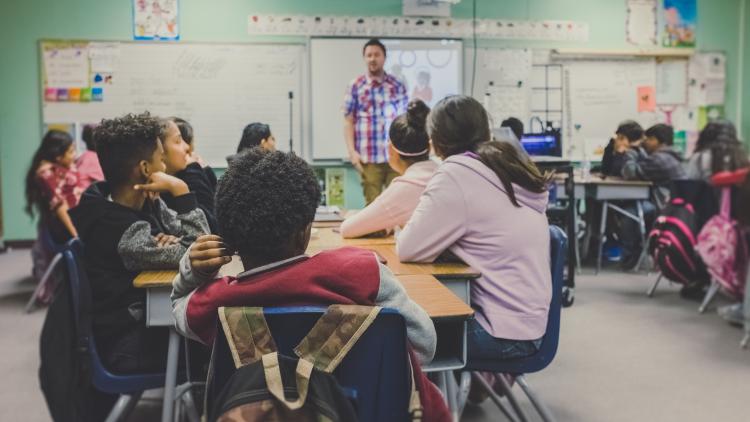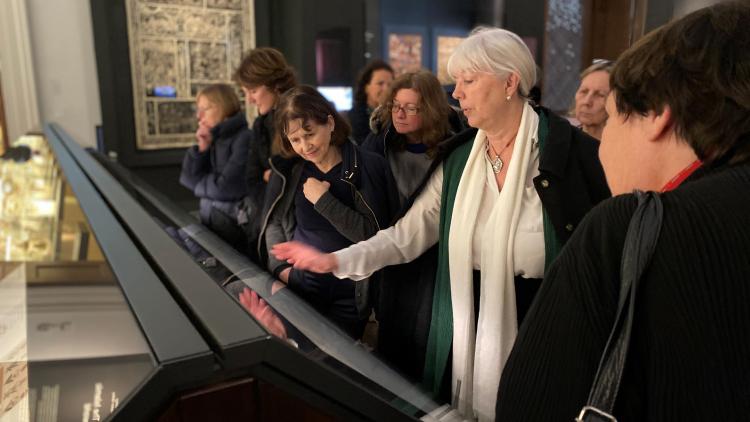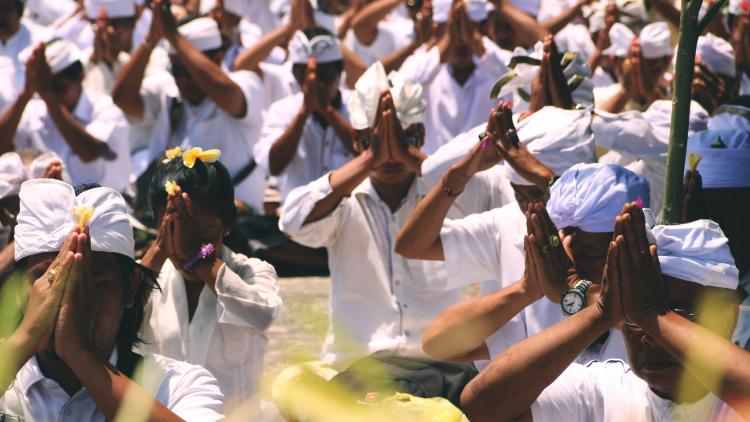BA Global Liberal Arts


Key information
- Start date
- Duration
- 3 years
- Start of programme
- September 2025
- Attendance mode
- Full-time
- Location
- On Campus
- Fees
-
Home: £9,535
International: £22,870 - Course code
- Y000
- Entry requirements
-
ABB
Contextual: BBB
-
Austria: Reifeprufungszeugnis / Maturazeugnis: four subjects at 1, 2, 2, 2
A Level equivalent: ABB
Contextualised offer: BBB -
Belgium: Diploma van Secundair Onderwijs: 75% (7.5/10, 15/20) overall
A Level equivalent: ABB
Contextualised offer: BBBInformation for prospective students from Belgium
-
Bulgaria: Diploma za Zavarsheno Sredno Obrazovanie: 5.3 and 5.0 in two State Maturity Exams
A Level equivalent: ABB
Contextualised offer: BBB -
Canada: High School Diploma: 80% with 5 acceptable Grade 12 subjects (most territories).
British Columbia: AABBB in Grade 12 courses.A Level equivalent: ABB
Contextualised offer: BBBInformation for prospective students from Canada
-
China: Senior Secondary Graduation Certificate + Gaokao: 78% overall in Gaokao PLUS 85% overall in Senior Secondary School Graduation Certificate (year 11 and 12)
A Level equivalent: ABB
Contextualised offer: BBBInformation for prospective students from China
-
Croatia: Matura Certificate: 4.5 overall with 5 in 1 Higher level subject
A Level equivalent: ABB
Contextualised offer: BBB -
Cyprus: Apolytirion with 2 A-Levels: Apolytirion 18/20 + A-level grades BB
A Level equivalent: ABB
Contextualised offer: BBB -
Czech Republic: Matura Certificate: 1, 2, 2, 2
A Level equivalent: ABB
Contextualised offer: BBB -
Denmark: Studentereksamen; Hojere Forberedelseseksamen; Hojere Handelseksamen; Hojere Teknisk Eksamen: 7 plus 10, 7, 7 in three Level A subjects
A Level equivalent: ABB
Contextualised offer: BBBInformation for prospective students from Denmark
-
Estonia: Gümnaasiumi lõputunnistus with the Riigieksamitunnistus: 4.0 with 85%, 80%, and 80% in 3 state exams
A Level equivalent: ABB
Contextualised offer: BBB -
Finland: Ylioppilastukint / Studentexamen: four subjects at 6, 5, 5, 5
A Level equivalent: ABB
Contextualised offer: BBB -
France: French Baccalaureat or Option Internationale du Baccalauréat (OIB): 13/20
A Level equivalent: ABB
Contextualised offer: BBBInformation for prospective students from France
-
Germany: Abitur: 1.8
A Level equivalent: ABB
Contextualised offer: BBBInformation for prospective students from Germany
-
Greece: Apolytirion of Geniko Lykeio with Pan Hellenic exams: 18/20
A Level equivalent: ABB
Contextualised offer: BBBInformation for prospective students from Greece
-
Hong Kong: Hong Kong Diploma of Secondary Education: 544 in two electives and one core (all other subjects grade 3)
A Level equivalent: ABB
Contextualised offer: BBBInformation for prospective students from Hong Kong
-
Hungary: Matura (Erettségi): 4.5 overall
A Level equivalent: ABB
Contextualised offer: BBB -
Iceland: Stúdentspróf: 7.5
A Level equivalent: ABB
Contextualised offer: BBB -
India: Standard XII: 75% (CBSE, CISCE, Tamil Nadu, Maharashtra & West Bengal boards), 80% (all other state boards)
A Level equivalent: ABB
Contextualised offer: BBBInformation for prospective students from India
-
Ireland: Irish Leaving Certificate: H1, H2, H2, H3, H3
A Level equivalent: ABB
Contextualised offer: BBB -
Israel: Bagrut: Overall grade of 7, 80% with 3 subjects at 5-unit level
A Level equivalent: ABB
Contextualised offer: BBBInformation for prospective students from Israel
-
Italy: Diploma Consequito con L’Esame di Stato: 80% overall
A Level equivalent: ABB
Contextualised offer: BBBInformation for prospective students from Italy
-
Latvia: Certificate of General Secondary Education: 88% in four State subject exams
A Level equivalent: ABB
Contextualised offer: BBB -
Lithuania: Brandos Atestatas: 8.5/10 and 90%, 85%, 85% in three State Exam
A Level equivalent: ABB
Contextualised offer: BBBInformation for prospective students from Lithuania
-
Malta: Advanced Matriculation Certificate: AB (Advanced) + BBB (Intermediate)
A Level equivalent: ABB
Contextualised offer: BBB -
Netherlands: Voorbereidend Wetenschappelijk Onderwijs: 7.5 overall with 8, 8, 7, 7 in four subjects
A Level equivalent: ABB
Contextualised offer: BBB -
Norway: Vitnemål vidergaende opplaering: 4.3 overall
A Level equivalent: ABB
Contextualised offer: BBBInformation for prospective students from Norway
-
Poland: New Polish Matura: 75% in three Advanced Level subjects
A Level equivalent: ABB
Contextualised offer: BBBInformation for prospective students from Poland
-
Portugal: Diploma de Ensino Secundario: overall 17.5/20
A Level equivalent: ABB
Contextualised offer: BBB -
Romania: Diploma de Bacalaureat: 8.5 overall
A Level equivalent: ABB
Contextualised offer: BBBInformation for prospective students from Romania
-
Singapore: Polytechnic Diploma (Nanyang, Ngee Ann, Singapore, Temasek and Republic Polytechnic): GPA 3.3
A Level equivalent: ABB
Contextualised offer: BBBInformation for prospective students from Singapore
-
Slovakia: Maturitná skúška / Maturita / Vysvedčenie o maturitnej skúške: four subjects at 1, 2, 2, 2
A Level equivalent: ABB
Contextualised offer: BBB -
South Africa: National Senior Certificate: 77666
A Level equivalent: ABB
Contextualised offer: BBBInformation for prospective students from South Africa
-
Spain: Curso de Orientación Universitaria / Título de Bachillerato: 7.5
A Level equivalent: ABB
Contextualised offer: BBBInformation for prospective students from Spain
-
Sweden: Slutbetyg / Examensbevis från Gymnasieskolan: A in 1200 credits and no grades below D / 18 / mainly B overall (MVG/VG)
A Level equivalent: ABB
Contextualised offer: BBB -
Switzerland: Federal Maturity Certificate: 4.5
A Level equivalent: ABB
Contextualised offer: BBB -
Tanzania: Advanced Certificate of Secondary Education: ACSE with BBB in 3 principle subjects
A Level equivalent: ABB
Contextualised offer: BBB -
Trinidad and Tobago: CAPE: Six CAPE units with grade 2 (+two double-unit courses)
A Level equivalent: ABB
Contextualised offer: BBB -
Turkey: Lise Diplomasi: 78-83% (depending on high school)
A Level equivalent: ABB
Contextualised offer: BBB -
USA: High School Diploma plus ACT, SAT, or AP exams:
-
High School Diploma GPA 3.0 plus SAT 1280 or ACT 27 and 2 AP's at 4,4
or -
High School Diploma GPA of 3.2 plus 2 AP's at 4,4
or -
High School Diploma GPA 3.4 plus SAT 1300 or ACT 29
or -
2-year Associate degree GPA 3.1
A Level equivalent: ABB
Contextualised offer: BBB -
-
See undergraduate entry requirements and English language requirements for international and alternative entry requirements.
Course overview
On the BA Global Liberal Arts programme, you will learn how to approach academic topics across disciplinary boundaries in the humanities.
By studying and learning in this way, you will become a critical global citizen who can disrupt the status quo and act as a force for progressive transformative change. SOAS’s BA Global Liberal Arts programme is homed in the School of History, Religions and Philosophies. Each year of study on this degree programme involves modules from 4 tracks: ‘Skills and Methods’, ‘Global’, ‘Regional’, and ‘Language’, which enable you to take modules from across the entirety of SOAS.
Our BA Global Liberal Arts programme provides you with a range of module combinations unparalleled on any other UK higher education undergraduate degree in the social sciences and the humanities.
Why study BA Global Liberal Arts at SOAS?
- SOAS is ranked 15th in the UK for Arts and Humanities (QS World University Rankings 2023)
- SOAS is ranked 6th in the UK for employment outcomes (QS World University Rankings 2023)
- Our average 20/21 Graduate Outcome Departmental score is 82.85% (HESA)
- We eliminated racialised awarding gaps at undergraduate level
Structure
The BA Global Liberal Arts programme's structure is based on the principle of interdisciplinarity, bringing together subjects from the Social Sciences and the Humanities, underpinned by language study as a way to enhance cross-cultural understanding and deepen the students’ engagement with their regional focus. The principle of interdisciplinarity is enmeshed in the global-regional distinction and needs to be taken into account when students design their individual programmes.
While the skills track is fixed, the other parts of the programme can prioritise either the Humanities or the Social Sciences, but both must be represented. Therefore, students opting out of the language will have to pick modules from the literature and arts track instead. Students studying a language can take literature and arts modules for their regional track, but will then have to choose a social science subject for the global track, or vice-versa.
Due to the number of options and the flexibility of the degree, timetable constraints have to be taken into account in the design of individual programmes.
Each year you will take a module in four different tracks:
- The Skills and Methods track focuses on acquiring the core skills you need to succeed at university and beyond, progressing from an introduction to Global Liberal Arts as a concept and practice and a history module that analyses historiography to a Liberal Arts module that develops the ability to engage with the world that surrounds us through theoretical and critical lenses to a dissertation in your final year.
- The Global track comprises a series of modules that ask you to understand the world as a whole, providing you with a broad framework within which to place your own regions of interest. It is also possible from the second year to develop a particular disciplinary specialisation.
- The Regional track comprises modules that focus on one of the five regions we study at SOAS - Africa, the Near and Middle East, South Asia, Southeast Asia, and East Asia - as well as modules focusing on particular countries. It is possible to focus on one region throughout your degree, or to study different regions in different years.
- The Language track allows you to pursue the study of one of the many Asian or African languages we teach at SOAS to the intermediate level. It is possible to study linguistics or literature in translation or other arts-related subjects instead of languages if preferred.
Module groupings
The degree draws on modules from throughout the School. The options can be found on the list of modules for the global, regional, and language tracks. They draw on open options offered by departments across the school and availability will therefore be subject to change.
In some cases the choice of a module may be subject to some restrictions. Please note the following in particular:
- The lists of available modules are subject to change on an annual basis, due to ongoing curriculum revision by the departments concerned. Students will be advised which modules are available each year prior to registration.
- Some modules are subject to pre-requisites and other restrictions (eg approval by the module convenor). Students are advised to check individual module pages carefully, so that they can plan ahead.
- The wide range of available modules means that there will be some timetable clashes between modules. Students are therefore advised to consider various module options at each stage of their degree.
The programme convenor and tutors will work carefully with each student to design their programme of study. At the beginning of the programme we will establish your intellectual goals and chart potential pathways. We will then consider your academic progress and future plans before making your module choices each spring.
About the modules
- The lists of optional modules below are compilations of all open options available at SOAS, as of July 2021, indicating how they fit into the programme structure of the BA Global Liberal Arts, so that students can see the full range of modules available prior to module sign-up. The list is subject to change on an annual basis, due to ongoing curriculum development by the departments concerned.
- Students must double-check the list of open option modules (language and non-language list) as well as individual module pages for any pre-requisites and other restrictions on modules. Students are also strongly encouraged to contact the module convenor before signing up for an optional module to ensure that they are adequately prepared for the module and that it will meet their academic objectives.
- Students should make sure that they are taking a full load each year (120 credits), and ensure that any one-term, 15-credit modules are evenly distributed between the two terms.
Important notice
The information on the website reflects the intended programme structure against the given academic session. The modules are indicative options of the content students can expect and are/have been previously taught as part of these programmes. However, this information is published a long time in advance of enrolment and module content and availability is subject to change.
Year 1 - Core and Compulsory
Year 1 - Guided options - Global track
List A or non-language open option
Year 1 - Guided options - Regional track
List B or non-language open option
Year 1 - Guided options - Humanities and Arts
List C or non-language open option
Year 2 - Core and Compulsory
Year 2 - Guided options - Global track
List D or non-language open option
Year 2 - Guided options - Regional track
List E or non-language open option
Year 2 - Guided options - Humanities and Arts
List F or non-language open option
Year 3 - Core and Compulsory
Year 3 - Guided options - Global track
List G or non-language open option
Year 3 - Guided options - Regional track
List H or non-language open option
Year 3 - Guided options - Humanities and Arts
List I or non-language open option
Teaching and learning
The teaching methods in modules will vary, depending on the subject matter and level of the module, as well as the number of students in the class.
Contact hours
The BA Global Liberal Arts is distinguished in that its core modules are taught seminar-style, in a two-hour bloc, to enable a focus on discussion and application of the skills and methods in question. There are also no written exams in these modules. They are assessed instead exclusively through coursework, which includes peer review and, in the second year, a group project.
Language modules are taught mostly in small tutorial groups. Most modules in the global and regional tracks will be taught through a combination of lectures and tutorials, usually one hour a week of each. Some modules are less strictly divided between lecture and tutorial and may be taught seminar-style. Students are advised to consult individual module pages for further detail.
Assessment in the global, regional, and language tracks can take a variety of forms, again depending on the module. Most modules use a balance of coursework and written exams. Language modules tend to make use of oral assessment. Some non-language modules can also require oral presentations and other non-written forms of assessment.
SOAS Library
The SOAS Library is one of the world's most important academic libraries for the study of Africa, Asia and the Middle East, attracting scholars from all over the world. The Library houses over 1.2 million volumes, together with significant archival holdings, special collections and a growing network of electronic resources.
The School makes extensive use of Moodle, an online learning environment, which allows us to distribute electronic materials, facilitate discussions et al. The School also has language laboratory facilities for formal teaching and self-study.
Pre-entry reading
Given the nature of the degree, it is not possible to suggest readings that will introduce the full range of subjects available during your three years. The following are only starting-points, therefore.
For introductions to the liberal arts
- Fareed Zakaria. In Defense of a Liberal Education. 2015.
- Jennifer M. Shepard. The Harvard Sampler: Liberal Education for the Twenty-First Century. 2011.
For introductions to the world and its history
- Robert Marks. The Origins of the Modern World. 2015, 2006, 2002.
- Manfred Steger. Globalization: A Very Short Introduction. 2013.
For introductions to the different regions studied at SOAS
- April A. Gordon and Donald A. Gordon. Understanding Contemporary Africa . 2013 et al.
- Roy Richard Grinker and Christopher B. Steiner. Perspectives on Africa: A Reader in Culture, History, and Representation . 2010 et al.
- John Iliffe, Africans: The History of a Continent . 2007 et al.
- William L. Cleveland. A History of the Modern Middle East . 2009 et al.
- Albert Hourani, A History of the Arab Peoples . 2005 et al.
- Albert Hourani, et al. The Modern Middle East: A Reader . 2004 et al.
- Sugata Bose and Ayesha Jalal. Modern South Asia: History, Culture, Political Economy. 2011.
- Barbara D. Metcalf and Thomas R. Metcalf, A Concise History of India . 2003
- John Talbot. India and Pakistan . 2000
- Craig Lockard. Southeast Asia in World History . 2009.
- N. Owen. The Emergence of Modern Southeast Asia . 2005.
- M.C. Ricklefs et al. A New History of Southeast Asia . 2010.
- Kent E. Calder and Ming Ye. The Making of Northeast Asia . 2010.
- Warren Cohen. East Asia at the Centre. 2000.
- Charles Holcombe, A History of East Asia . 2010.
Fees and funding
Fees for 2025/26 entrants per academic year
| Programme | Full-time | |
|---|---|---|
| Home students | Overseas students | |
| BA, BSc, LLB | £9,535 | £22,870 |
| BA/BSc Language year abroad | £1,385 | £11,430 |
See undergraduate fees for further details
Employment
With specialised historical knowledge, an understanding of cultural sensibilities and skills in research and analysis, graduates from the Department of History are well respected by employers across private and public sectors.
Recent graduates have been hired by:
- Al Jazeera
- Amnesty International
- Bank of England
- BBC
- Blackstock PR
- Bonhams
- British Council
- British Library
- Dataminr
- Ernst and Young
- Goldman Sachs
- HSBC
- International Committee of the Red Cross
- KPMG
- Middle East Consultancy Services
- Ministry of Foreign Affairs, Republic of Cyprus
- Natural History Museum
- Publicis Media
- UNESCO
- United Nations Development Programme
Find out about our Careers Service.












